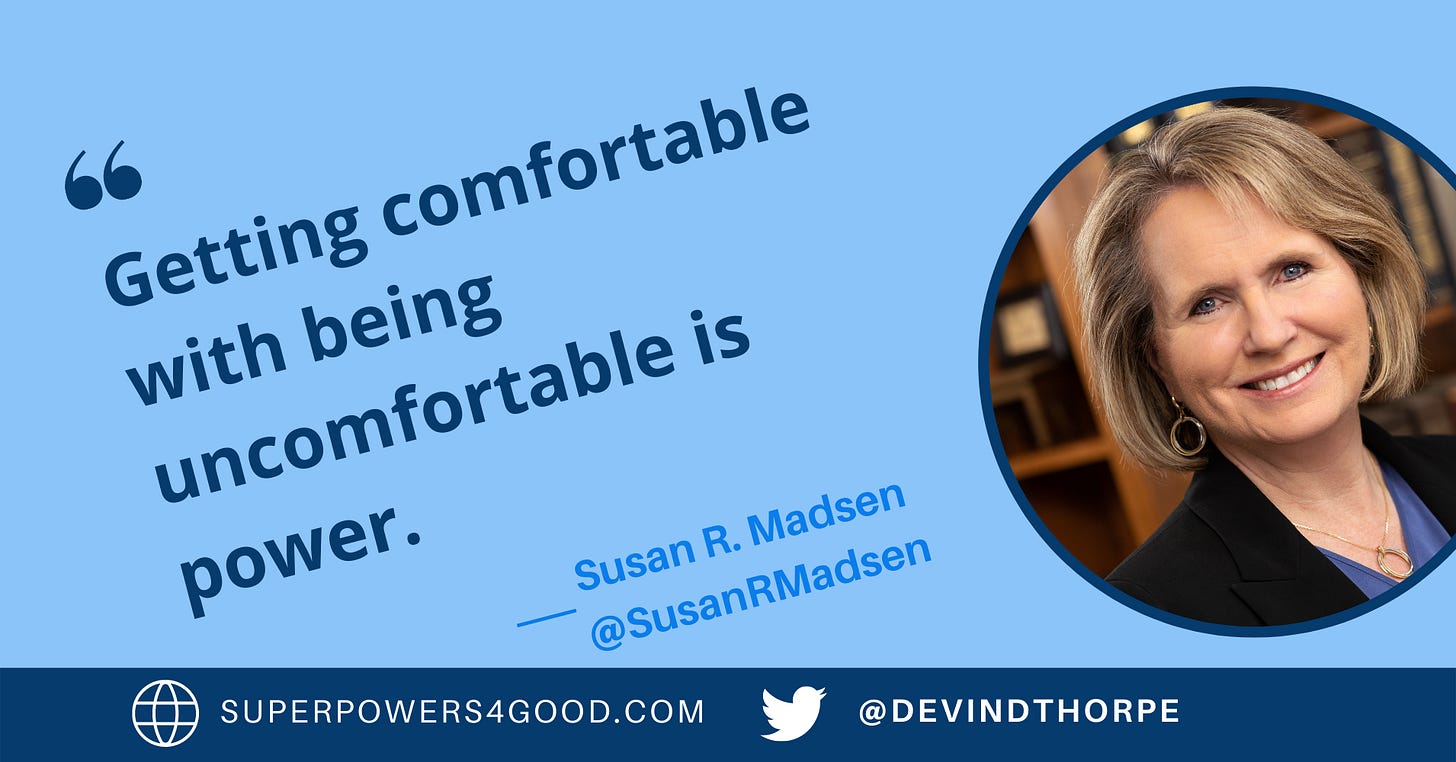Devin: What is your superpower?
Susan: I think my superpower has got to be my passion about the topic of strengthening the impact of girls and women in Utah and also worldwide. I am deeply—my purpose is so strong. But I would add that I have a lot of stamina to do a lot of work. And I’m not afraid. So I think maybe it’s my age, maybe it’s—I don’t know what it is, but at this point in my life, I speak truth, and I base that on research.
Dr. Susan R. Madsen was as surprised as anyone when she and her team put out a survey requesting feedback about sexist remarks women had experienced. When she described the number of women who responded, about 1,000, typically with more than one ready example of sexism, she said, “Isn’t that crazy!”
Based on her prior research, she had expected only 100 to 200 women to respond.
Susan is the founding director of the Utah Women & Leadership Project and an endowed professor of leadership at Utah State University. Her latest research is propelling her to new levels of international recognition.
The final tally of sexist comments was over 1,700. Susan and her team are releasing the work in five separate briefs, the fourth of which was just published yesterday—after we recorded this podcast. The title for the series is “Sexist Comments and How to Respond to Them.”
An initial brief provided context for what would follow. Susan and her team separated the comments into four areas, and they will produce a brief for each, with the last one expected early next month. The four briefs cover:
Undervaluing Women
The team further segmented each brief, grouping comments into common themes.
Some of the comments the women reported were too upsetting to be included in the published reports, Susan says. “Some of the comments are just very disturbing.”
About 85 percent of the comments were from men. Women made the vast majority of others. Women even reported a few sexist comments from children, presumably reflecting their parenting and socialization.
Susan and I focused our discussion on the second report, Objectification, which was new when we spoke. The team further segmented those comments into seven sub-categories:
Focus on Physical Appearance/Bodies
Sexual Harassment
Sexualizing Women
Unwanted Sexual Advances
Intersectional discrimination
Excluded from work activities
Accusations of using sex to get ahead
The comments in the report are often shocking. Too often for me, they felt familiar, reminding me of things I’ve regrettably said to women in the past, intended as compliments. I take modest comfort in not having uttered anything of the most egregious sort.
Examples
Susan shared examples, and I’ve pulled a few more from the brief. You’ll want to read all the briefs to get a clear sense of how bad it can be for women.
Here are some examples of things said under the category of “Focus on Physical Appearance/Bodies”:
“The first time we met, he said, ‘What a surprise. I thought you’d look a lot older than you do. You’ve still got a good ten years of sex kitten left in you!’”
“A manager asked, ‘How do you keep that slim figure?’”
“In a setting with friends and family, this man commented that women shouldn’t serve as president because ‘once every month, the country would be in deep trouble’ (referring to a woman’s monthly period), insinuating that a period and any moodiness associated with a period makes a woman unfit to hold the presidency.”
Under the heading “Sexual Harassment,” a sampling includes:
“While at a speaking event where I was about to present, the host was having issues with the mic, and I went to help fix it and had to have my head down under the podium, and he said, ‘While you’re down there, . . .’”
“I worked in a congressional office, and my boss would make sexist and inappropriate comments frequently. I finally called and reported him but was told, ‘Unless he touches you, there’s really nothing we can do. Congress wrote themselves out of the sexual harassment laws.’”
“A male superior suggested that I come to the office on Halloween in costume dressed as a sexy nurse.”
From the section on “Sexualizing Women,” I found these examples:
“He said, ‘Women shouldn’t work because that just creates more opportunities for extramarital affairs.’”
“My husband’s co-worker said, ‘You know your wife is going to have an affair,’ as a response to my being in MBA school.”
“He said, ‘If you dress in clothes that are tight, you are inhibiting the ability of our men to do their jobs. You are a distraction.’”
From the category labeled “Unwanted Sexual Advances,” these pop up:
“I was looking for a place to sit during a conference we were both attending. He and I were both members of a city council, though for different cities. He patted his lap and told me I could sit there.”
“When I tried to extend my hand, he embraced me in a hug and said, ‘I’m a hugger.’ It was very unprofessional, especially since we didn’t know each other.”
“A male colleague told me, ‘Those jeans look good. They’d look better draped over my dresser.’”
Within the category labeled “Intersectional Discrimination,” I observed these comments:
“A man serving a lesbian couple said, ‘So since there is no man here, who is supposed to pay me? Who’s in charge?’”
“After removing a coffee mug from where it shouldn’t be, I heard one of the men say, ‘ornery old bag.’”
“One of our board members asked me where I was from. I told him, Ogden. He then asked again, but this time asked the origins of my parents. When I replied that my father is American and my mother is Asian, he said to me that he thought Asian women were the most beautiful women in the world and then he touched my arm.”
The section on “Excluded From Work Activities” yielded the following:
“I was working towards becoming a partner in my company. One of my co-workers kept mentioning that the partner who was over both of us had been telling him what he needed to do to become a partner. I had never had this conversation. I asked to meet with this partner and said, ‘Is there a reason that you don’t tell me what I need to do to be a partner?’ and he said, ‘I only talk to him about that when we go to lunch, and it would be inappropriate for me to take you to lunch, so I can’t talk to you about it.’”
“In discussing who should travel with a candidate I was representing, an off-hand comment was made, ‘Well, you can’t travel with him because that creates perception problems.’”
“A male colleague told me, ‘My wife has to meet every woman I travel with.’”
The final section on “Accusations of Using Sex to Get Ahead” includes:
“A male superior said, ‘I don’t know what happens behind closed doors with you and him to have led you to receive more resources and support than other faculty receive.’”
“I got the highest grade on a test in a computer science class. When I shared the good news, one of my male peers said, ‘I wish I could sleep with the professor so that I could get an A.’”
“I had a co-worker tell me that the reason I got a promotion was because of my breast size.”
This list is just a sampling, but it is indicative of what you’ll find in the briefs.
Goals of the Reports
Susan hopes the briefs will provide women with strategies for responding to these comments. Too often, women facing sexism from a boss are structurally discouraged or prevented from taking action.
She also hopes men will learn from the briefs that some of what they think is benign or humorous isn’t either of those things.
Susan offers an example of how to respond to a boss or peer with good intentions but poor behavior patterns.
You know what? I know you really want to respect people, and I know you have a good heart. Let me tell you what that comment to me or my peer really felt like because I don't think you intended that.
“I’ve had men tell me that that women have done that, and they’re like, ‘Wow, I didn’t realize that,’” Susan says.
She offered another example:
I don't know if you've read my Forbes piece on calling women girls and that with that whole thing. But I've been in meetings where more men are at the meetings and they'll say, well, the girls in the front office and I'll say. Well, are you boys going to, you know? Yeah, but and then I smirk, I like, Yeah, I want them to hear that. And then they smile, and it's not that I slap to their wrist, you know, or. But I made a point and with some humor to teach, that's my hope that it taught.
In her work, Susan says her superpowers, a sense of purpose, stamina and fearlessness help her do more.
How to Develop a Sense of Purpose, Stamina and Fearlessness as Superpowers
Susan connects her stamina and fearlessness to being driven by a deep sense of purpose.
“What we know from the research is when women feel called or feel this purpose to lead, whether they want to or not, they’ll lean in, they’ll step forward, and they’ll use their voice and lead in ways that are not comfortable,” Susan says.
“Getting comfortable with being uncomfortable is power,” she adds.
“I believe in God, and many people do,” Susan says of the process for finding or defining purpose. “But even if we don’t, I mean, we can feel that calling or purpose that we’re made to do certain things.”
“And each of us is so unique. When you study neuroscience and the brain, we each have unique, distinct gifts and strengths and so many places to use those in this world for good,” she says.
She offers this advice for finding your purpose:
I really do encourage people to seek for purpose, and that takes some understanding our strengths, understanding our gifts, understanding what our heart tells us. The head, heart and hands, right? It makes our head like, what do we love thinking about first thing in the morning and what makes our heart leap? And what do we want to do? What does all that together make us want to do? Paying attention to that is key.
Susan offers another bit of advice for discovering your purpose: journaling. She suggests writing by hand but, more importantly, that you write self-reflections on what you want your life to be. Write down how you can use your gifts, strengths and superpowers to make a difference in your workplace or community.
By following Susan’s advice, you can make purpose, stamina and fearlessness superpowers to help you do more good.

















Share this post